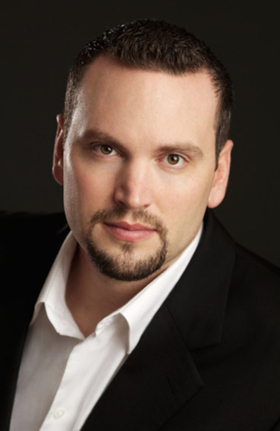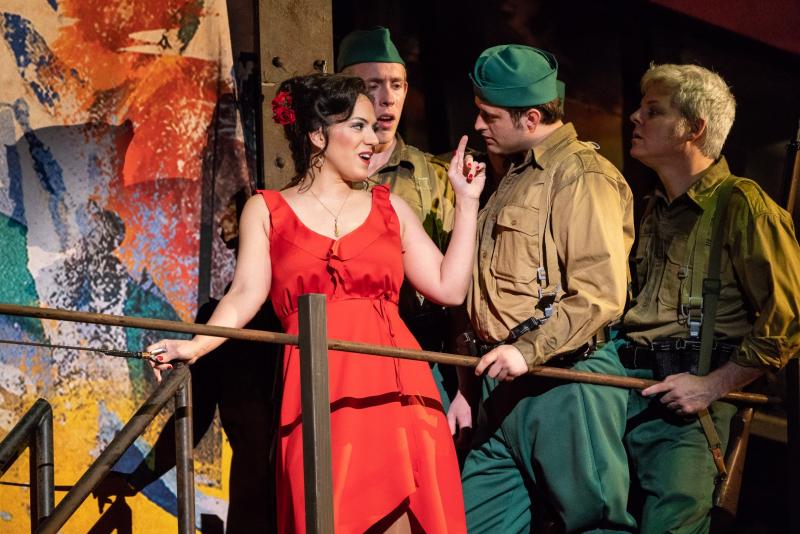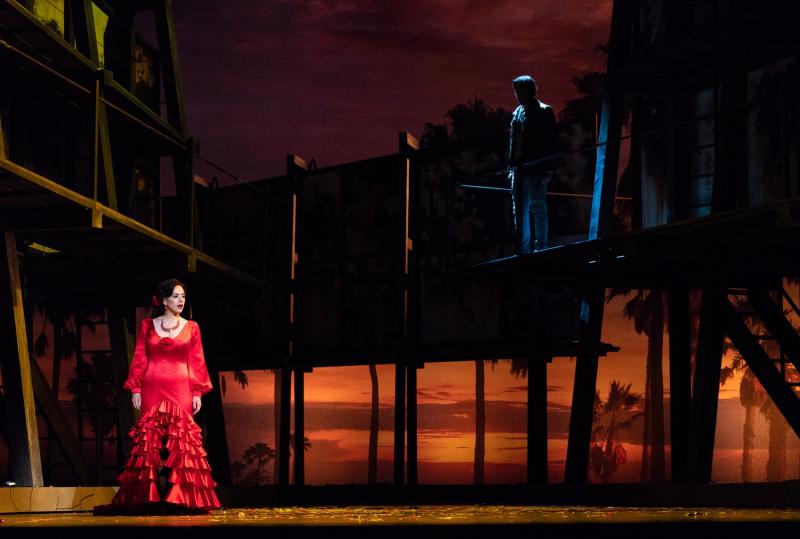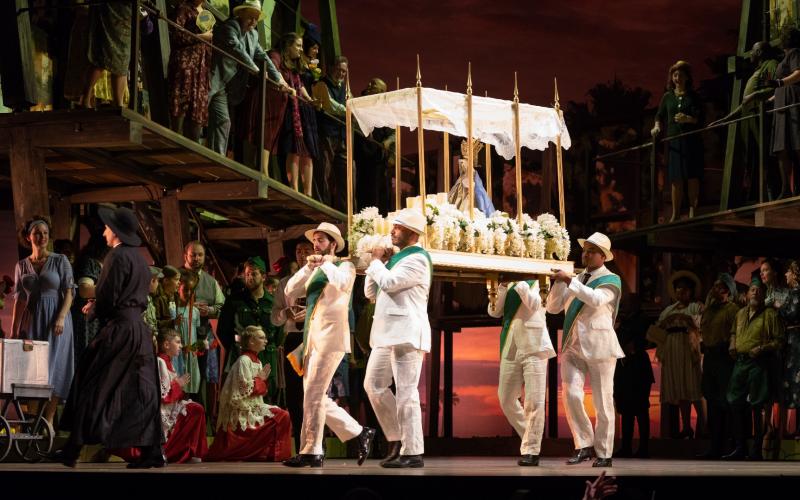Interview: Scott Quinn Analyzes Don José's Deepest Secrets

Seattle Opera's upcoming Carmen features instantly recognizable music, an opulent new production, and a number of company debuts. Tenor Scott Quinn as the opening night Don José is not among the latter; he last impressed Seattle audiences with his 2017 performance as Boris in Katya Kabanova.
The Marshall, TX, native counts among his other roles such iconic ones as Alfredo in Verdi's La Traviata and Rodolfo in La bohème, and less commonplace roles like Elemer in Richard Strauss's Arabella. A veteran of San Francisco Opera prestigious Merola Opera Program, Quinn discusses his unusual journey, from his country music origins to the operatic domain.
Erica Miner: Welcome back to Seattle, Scott! We enjoyed your debut performance as Boris in 2017's Katya Kabanova.
Scott Quinn: That was a lot of fun. just a dream for me.
EM: Was it a hard role to debut in?
SQ: It was incredibly difficult. Czech is not the easiest to sing in, but we had a wonderful coach.
EM: Trial by fire. If you can do that, you can do anything.
SQ:That's right [Laughs]. I really believe that.
EM: As a native of a part of Texas just across the border from Shreveport, Louisiana, land of country music, how did you first become involved with opera?
SQ: I went to college at Stephen F. Austin University not really knowing what I wanted to do. I wanted to play baseball, but I didn't have the stature most players had, so I gave that up. I was taking voice lessons in the choir. I liked musical theater, but I'd never been interested in opera. I just wasn't exposed to it. In East Texas you hunt, fish [Laughs] and listen to country music and classic rock, things like that. But when I had private voice lessons with a teacher from the university, he said, "You really need to audition and see if you can get a scholarship. That might help you decide what you want to do." I did, and got a small scholarship, which helped with some of my school-get my basics done, sing a little bit and have time to change my major.
EM: What did you first sing?
SQ: The funny thing is, the very first opera I sang in was Carmen. As Morales. I was a baritone at the time, or so I thought. Once I was onstage singing I thought, "Wow, I really enjoy this, something I've never experienced before." We only did one opera a year, always in English, but it still fascinated me. Then I went to the University of Tennessee in Knoxville for a Masters. I couldn't afford to go to school and live, so I went back home and found a job in the oil and gas business as a land man.
EM: Oh my goodness.
SQ: [Laughs] Yes! I did that for a couple of years. The money was great but there was still something missing. One day my mom saw in the newspaper that Shreveport was giving an opera competition. I'd been a good 2 years out of singing, but mom said, "Why not go do it. If you don't make it to the semis, you can just walk away." That was kind of my mentality. I'd give it one more shot. I still hadn't had formal training. I did make the semis and I thought, "Well, that's nice." I sang the Flower Song and De' miei bollenti spiriti and WON the thing. It was just Shreveport, but there were singers from Juilliard, Manhattan School of Music there. I hadn't been singing for 2 years, my diction was probably terrible, and I was backstage drinking coffee and eating donuts right before I sang while everybody else was drinking their water [Laughs]. I didn't think I had a chance-and ended up winning. I thought, "This is a sign." From there I had a couple of small gigs. Then Jonathan Pell, general director of Dallas Opera, heard me and asked if I wanted to be their artist-in-residence. I did some small roles. I still didn't get a lot of training, just stage training, though I got to be onstage and watch how other singers worked. Probably the most vital thing for a singer is to be around people who've sung for a long time.
EM: Agreed. You covered the role of Greenhorn for Jake Heggie's Moby Dick in Dallas, which you consider your first big break.
SQ: That was the last thing I did with them prior to going to the Houston studio. Patrick Summers was conducting.
EM: That was the world premiere, yes?
SQ: Yes. Everything had a cover because in a world premiere the show has to go on, no matter what. All the covers got to sing for Maestro. I'll never forget, as I was walking out of the building, he took me aside. I thought, "Oh no, I've screwed this up."
EM: "'What have I done?'"
SQ: [Laughs] Exactly. He said, "Have you ever considered being in the Houston Grand Opera Studio?" I said, "Actually, no, but that sounds enticing." He said, "Those auditions and the Merola auditions are going on right now. If I can get you an audition in Chicago, would you be able to do that?" I said yes, of course.
EM:Merola is a very big deal.
SQ: Absolutely. I flew to Chicago, kind of last minute, and got into both Merola and Houston, and did one right after the other. I was singing well at the time so I don't feel like there were any favors done for me. I was in Houston for 3 years-most people do 2 but I was so raw and green that I needed that extra year of help, especially with my languages and musicality, things you can build other than just natural gifts. I've been working almost non-stop since then. Those programs just rocketed me into this business. My first thing out of the studio was Ferrando in Così fan tutte. It was the hardest thing for me because it's so much recit. But I was able to do it. 2 or 3 years prior, I'd have said there was no chance.
EM: Mozart has its own special difficulties.
SQ: Exactly. But I'm so glad to be here now. Seattle is one of the top companies in America, and I'm so blessed to bring one of my favorite roles. I've only done Don José once before, but I love the opera, the character, and I love that I'm coming back to sing it in Seattle.
EM: That role is one of the most iconic and most difficult in the repertoire. As to his character, the contrast between him and Carmen is huge, and their personalities are so different. How would you describe those differences?

SQ: I would call him a manic depressive, bipolar. He changes his mood on a dime. He's so enamored of Carmen, but it's nobody he would ever consider for himself. He thinks Micaela is too good for him. That's why he steers clear of that situation. At first he doesn't know what to think of Carmen. He want to throw her flower away but he holds on to it and has it throughout his prison sentence.
EM: He's entirely smitten with her and doesn't know why.
SQ: Exactly. Most people don't know that before the story he actually had committed murder. He beat someone at a game; that person picked a fight and José ended up killing him. He either had to go to prison or become a soldier.
EM: So he wasn't there by choice.
SQ: Right. He's not happy already about his situation. He also was trying to become a priest, which adds another layer. When he kills Carmen in the end he says, "Damn you." I wonder if he sending her to hell. That's just me reading into his upbringing. He sees a lot of his mother in Micaela, but there's just something fascinating about Carmen-infatuation is the best word.
EM: Many are infatuated, but in his case is it the fact that he's a country bumpkin and he's overwhelmed with her urbane sophistication and experience?
SQ: Yes, and she likes him because he's not paying any attention to her.
EM: The less he says, the better.
SQ: [Laughs]. She's for sure the controlling one in the relationship. She gets what she wants.

EM: Is this Seattle Carmen your first main stage Don José?
SQ: I did it with Arizona Opera, a nice way to test out the role. It's similar to how I'm doing my first Cavaradossi right now in North Carolina. 2 performances and I wish there were 50 more. I love this role, just like I love Don José.
EM: Two roles that are at the top of most tenors' lists.
SQ: Absolutely. Two of the most famous roles and arias. There's always a Tosca or a Carmen going on somewhere in the world.
EM: Of those 2 languages, is there one that you prefer to sing?
SQ: Italian, by far. It just sits easier for me, it flows better. However, French isn't as difficult as German. It still has the same legato flow as Italian. In Czech it's sung exactly how a speaker would speak it, that's the rhythm of everything in Katya. Once you have the essentials of the language down, it's much easier to sing. But Italian is my bread and butter, the one I do the most. Don José is the only French role I've performed onstage. I'm looking forward to getting better at my French. You can't get out all the nasal sounds and still sing a pure sound. I try to listen to native French speakers-Alagna comes to mind-it's so much different than an American singer singing French.
EM: What's coming up for you in the near future, and which roles are you dying to sing?
SQ: Luckily I've gotten to check off some of my top, Cavaradossi being one of them. Coming up I'm singing the Duke (Rigoletto) in Houston. Then I have my Pittsburgh debut as Don José next season. I'm excited about those. Houston is kind of my home base, and Pittsburgh-I haven't done anything in the northeast and I'm trying to inch my way up to New York [Laughs]. This is the first time I've had to learn 2 big roles at once, though I've done Carmen before. I think every tenor wants to sing Calaf, but that's years away for me. I like the challenge of the role. Radames as well, and Otello. Things that I may not develop into, but if I had a chance I would pick those.
EM: Everybody should have a wish list. And that one sounds pretty good. Have you sung in Russian?
SQ: I did Lensky in Eugene Onegin for the Northern Lights Music Festival in Embarrass, Minnesota [Laughs]. But they brought people from the Mariinsky-singers, director, more than half the cast was Russian. The conductor was American but he's been working in Russia for many years. It was the best way for me to learn my first Russian role. On my feet, as I'm staging, getting a diction lesson, such a wonderful experience.
EM: What a way to learn it, surrounded by Russians.
SQ:It was incredible. That also is one of my top roles that I love to sing, one I hope to sing again.
EM: I have no doubt you will. It's been such a pleasure to talk to you, Scott. Thank you. I'm looking forward to your Don José!
Seattle Opera's Carmen opens May 4 and runs through May 19, 2019 https://www.seattleopera.org/carmen

Photo credits: courtesy of the artist; Steven Pisano
Comments

Videos

